Current Fellows
Illinois Distinguished Postdoctoral Research Associates
2023-2024

Gabriela Garcia
Department of English
MFA in Creative Writing, Purdue University
Gabriela Garcia is a fiction writer and poet. She is the author of the novel Of Women and Salt, a New York Times and indie bestseller, winner of the International Latino Book Award, a New York Times Editors’ Choice, and a Good Morning America book club pick, among other honors. Of Women and Salt was named a best book of the year by The Washington Post, The Boston Globe, Harper’s Bazaar, and many other publications. Her writing also appears in Best American Poetry, the New York Times, Ms. Magazine, Tin House, Zyzzyva, and elsewhere. She is the recipient of a Rona Jaffe Foundation Writer’s Award and a Steinbeck Fellowship from San Jose State University. Her writing has received support from Bread Loaf, the Community of Writers, Willapa Bay AiR, Lighthouse Works, and others. She holds an MFA in fiction from Purdue University.
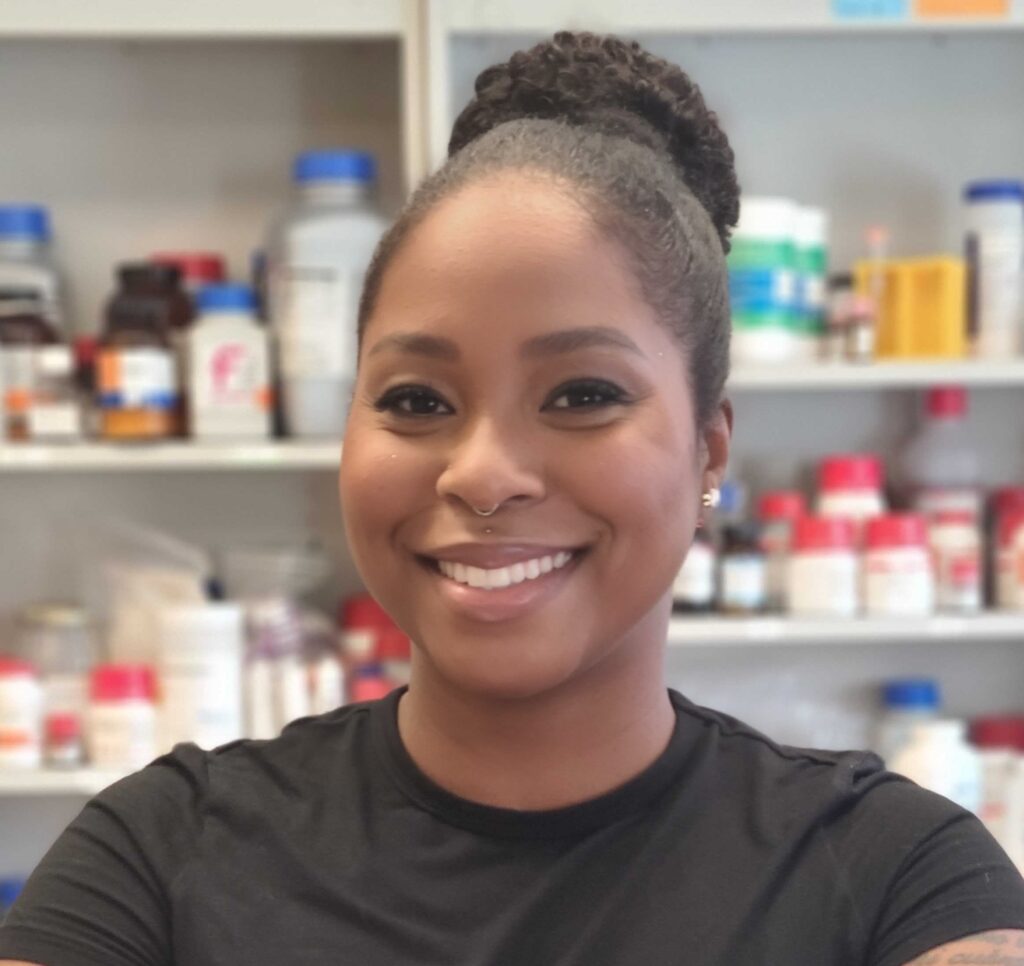
Christy Gibson
Department of Crop Sciences
Ph.D. in Ecological Sciences and Engineering, Purdue University
Dr. Gibson is an Illinois Distinguished Postdoctoral Scholar in the Crop Sciences department at the University of Illinois at Urbana-Champaign. She completed her master’s in Soil and Plant Science at Tennessee State University and her doctoral training in the Ecological Sciences and Engineering Interdisciplinary Graduate Program at Purdue University. Dr. Gibson recently completed postdoctoral research with the Center of Advanced Energy and Bioproducts Innovation at the University of Illinois Urbana-Champaign, where she measured greenhouse gas emissions from bioenergy agroecosystems to inform on the sustainability of candidate bioenergy crops. She is interested in regenerative, precision, and conservation agriculture, explicitly focusing on severe weather’s impact on cropping systems’ resilience as climate changes. Outside of research and teaching, Dr. Gibson is a community builder with extensive diversity, equity, inclusion, and justice career service.

Marísa Hicks-Alcaraz
Department of Gender and Women’s Studies
Ph.D. in Cultural Studies, Claremont Graduate University
As a transdisciplinary scholar and media maker-curator, Marísa Hicks-Alcaraz brings together digital ethnic studies, media arts practice and curation, liberationist political thought, U.S. Latin American diasporic studies, intersectional feminism, and grassroots archival praxis. Her research aims to de-center Western ways of knowing and challenges extractivist and capitalist practices by adopting a relational framework to publicly-engaged scholarship that is committed to collective liberation. Her most recent projects focus on the digitization of civil rights era U.S. Chicana, Puerto Riqueña, and Cubana film archives and archival storytelling in partnership with students from the Social Justice program at Centennial High School in Champaign, IL.
Marísa’s writing has appeared in the International Journal of Information, Diversity & Inclusion; Journal of Feminist Media Histories, Interdisciplinary Digital Engagement in Arts & Humanities; and Reviews in Digital Humanities. She is the former director of programming for the Latin American Cinemateca of Los Angeles and Student Film Festival and has curated programs for the Museum of Modern Art, New York; MIX NYC; the Chicano International Film Festival; The Markaz: Arts Center for the Greater Middle East; the Watsonville Film Festival; and the Vincent Price Art Museum. She is the co-founder of Imaginx en Movimiento (IXeM), a memory collective that partners with individuals and cultural organizations of racialized U.S. Latin American diasporas to explore Do-it-Together (DiT) methods for grassroots digital archiving and media arts production.
Marísa has also been awarded a number of fellowships and awards for her research, arts curation, and teaching, including the The Marian and Charles Holmes Performing Arts Fund; the California State Polytechnic University, Pomona, Outstanding Faculty Award; the Friedman Grant; and Mellon Mays Graduate Student Enhancement and Predoctoral Research Development grants. She earned her M.A. in Cinema Studies from NYU and B.A. in Middle Eastern and North African Studies from UCLA.

Jennifer Johnson
Department of Education Policy, Organization & Leadership
Ph.D. in Educational Studies, University of Oklahoma
Jennifer Johnson is a citizen of the Seminole Nation and a descendant of the Sac & Fox Nation. She was an elementary school teacher on Tribal reservations in Arizona and Florida. In 2010, she was honored by the Seminole Nation for her efforts in language revitalization as the first recipient of the Heritage Award. Dr. Johnson was a cofounder of Pumvhakv Immersion School, a language learning school for early childhood through college students within the Seminole Nation. In 2017, she provided Public Witness Testimony before the U.S. House of Representatives Interior, Environment and Related Agencies Subcommittee Committee on Appropriations in support of funding for the National Endowment for the Humanities. Her research interests include the history of education in Indigenous communities, Indigenous language revitalization and Indigenous knowledge systems. She was a 2020 National Academy of Education/Spencer Foundation Dissertation Fellow.

August “A.J.” Jenkins
Department of Human Development and Family Studies
Ph.D. in Human Development and Family Studies, The Pennsylvania State University
August Jenkins is a Postdoctoral Researcher of Family Diversity and Illinois Distinguished Postdoctoral Scholar in the Human Development and Family Studies (HDFS) department at the University of Illinois at Urbana-Champaign. She completed her master’s and doctoral training in HDFS at Penn State University, where her dissertation research was supported by the National Research Service Award (F31) Pre-doctoral Fellowship to Promote Diversity in Research from the National Institute on Minority Health and Health Disparities. August’s research focuses on the socioecological and gendered connections that impact the intimate relationships and mental-emotional health of Black Americans across time.

Brenda Straka
Department of Psychology
Ph.D. in Social Psychology, Duke University
Brenda Straka earned her B.A. in Psychology and Cognitive Science with a minor in English from the University of Virginia and her M.A. and Ph.D. in Social Psychology as well as a Certificate in College Teaching from Duke University in 2022.
In her research, she studies the ways people navigate social exclusion and discrimination and construct social identities across multiple group memberships throughout the lifespan. In one line of her research, she explores the ways historically marginalized and underrepresented groups (e.g., Multiracial, Latino/a/e, Native American people, first-generation students) experience exclusion and negotiate their group-based identities. In a second line of work, she studies the developmental cognitive foundations of understanding group membership and identity. Dr. Straka has received several recognitions and awards for her research and leadership such as the Heritage Dissertation Research Award from the Society for Personality and Social Psychology, a Clara Mayo Research Grant from the Society for Psychological Study of Social Issues, a Charles Lafitte Foundation Grant Award, a Teaching Fellowship from The Otis Green Foundation, and a Fellowship with the Preparing Future Faculty Program.
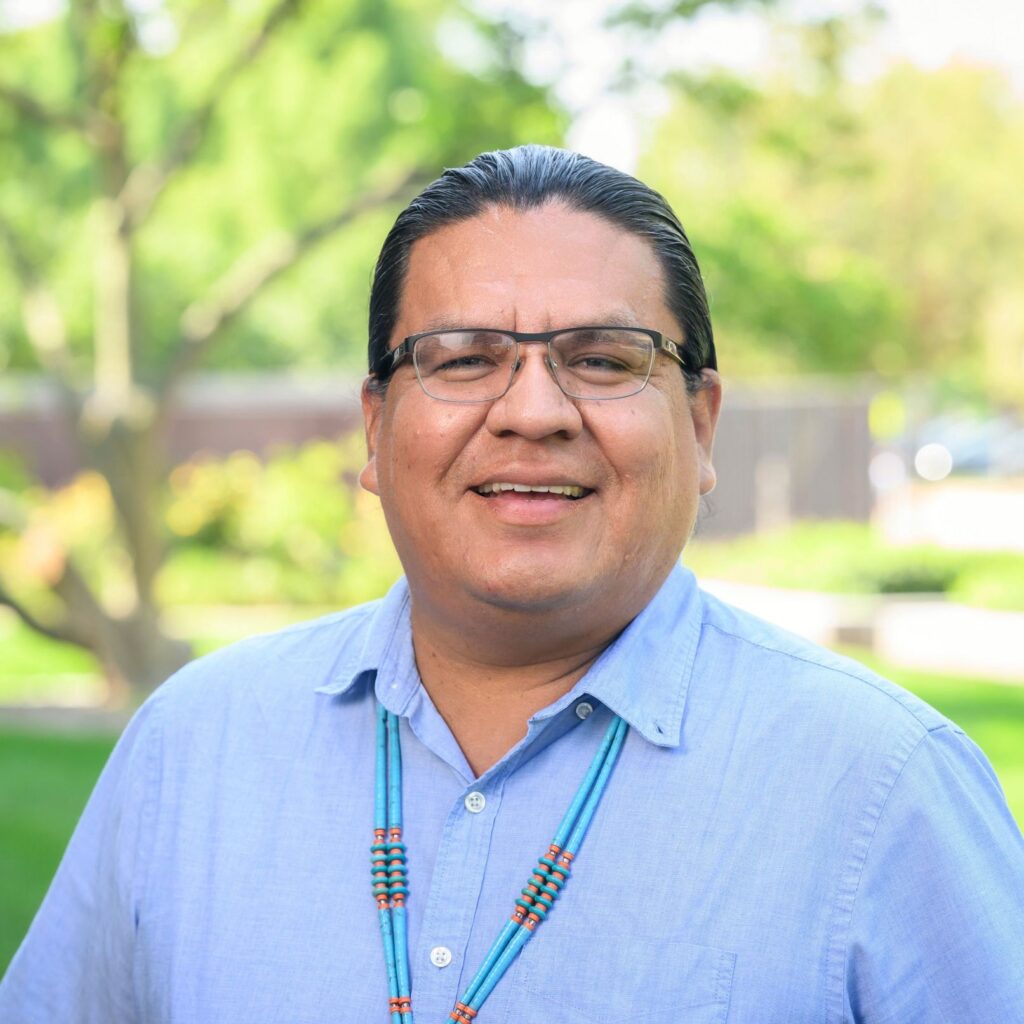
Oliver Tapaha
Department of Education Policy, Organization and Leadership
Ph.D. in Education, Oregon State University
Oliver Tapaha is a citizen of the Diné/Navajo tribe from northeastern Arizona. His maternal clan is Naakai Diné’e (the Mexican People Clan) and his paternal clan is Hónágháahnii (The-One-Who-Walks Around Clan). He earned his B.A. degrees in Sociology and Elementary Education from Arizona State University and his Ed.M. and Ph.D. in Education from Oregon State University. Oliver has 12 years of K-12 teaching experience in a locally controlled tribal school and two public school districts on the Navajo reservation. He also held two administrative positions at Diné College. Additionally, he served a four-year term as a governing council member for Six Directions Indigenous School in Gallup, N.M. In 2021, Oliver completed a culturally responsive school administration training program through the First Americans’ Educational Leadership program at the University of North Carolina at Pembroke. His principal internship experience was supported by the North Carolina Principal Fellows Program. In the last two years, he was an elementary school principal in his home community. Oliver’s research interests are Indigenous knowledge systems, Indigenous leadership, and Indigenous education sovereignty.
Past Fellows
Alexandra Barbier – Department of Dance

Alexandra Barbier is an artist, educator, and performance maker whose practices emerge from dance, performance art, Blackness, and queerness. She has recently been awarded NCCAkron’s 2022 Community Commissioning Residency, selected for her research on queer Black vernacular dance and how it operates inside and outside of academia. Her performances have been presented through Of Moving Colors Contemporary Dance Company, the University of Utah, Deseret Experimental Opera, Salt Lake City Performance Art Festival, Great Salt Lake Fringe Fest, loveDANCEmore, and Queer Spectra Arts Festival. Before joining UIUC’s Department of Dance as a Postdoctoral Research Associate, she was the Raymond C. Morales Post-MFA fellow in University of Utah’s School of Dance. Alexandra holds a BA in French with a minor in Women’s and Gender Studies and an MFA in Modern Dance.
Yousif Hassan – School of Information Sciences
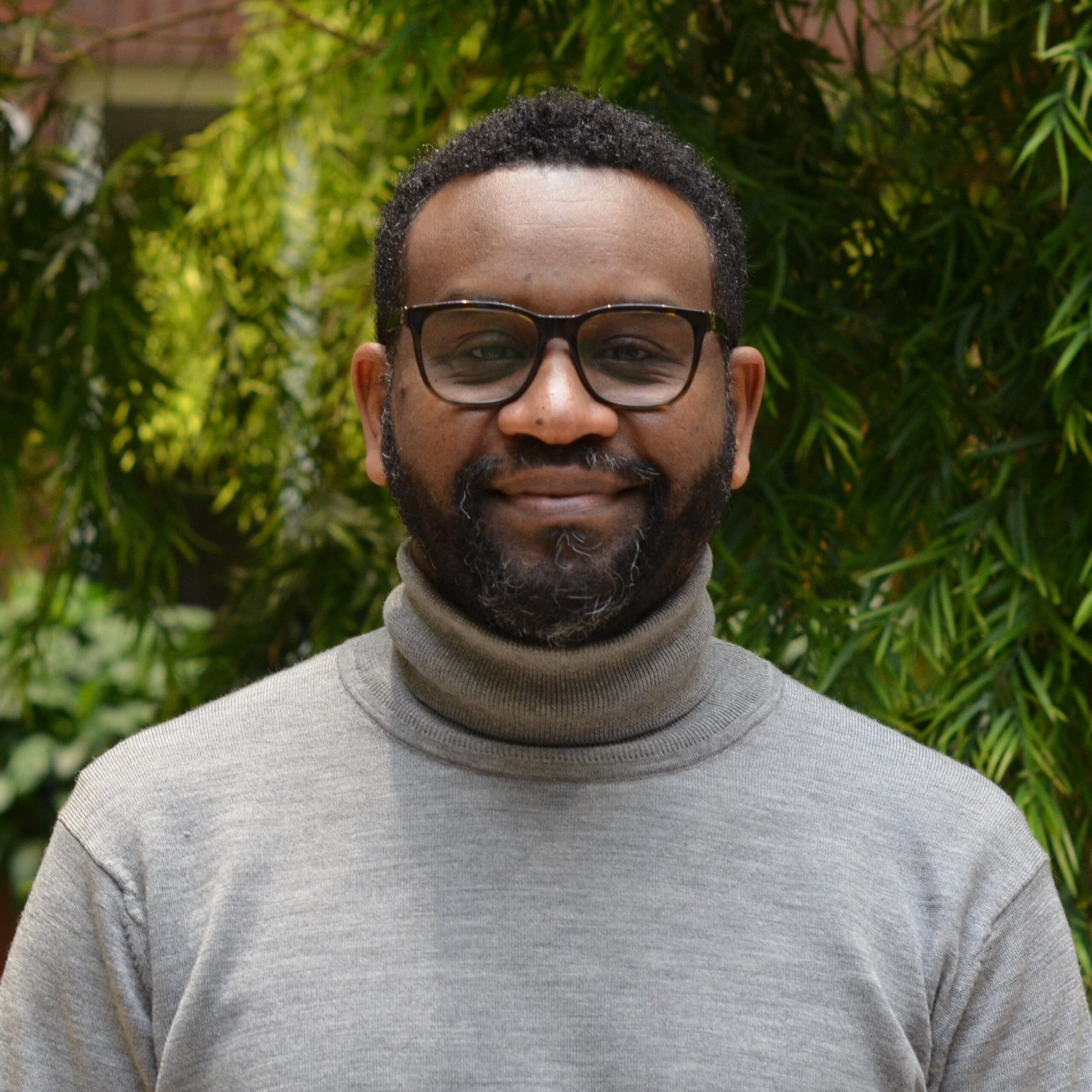
Dr. Yousif Hassan’s research examines the relationship between race, digital technology, and technoscientific capitalism. His work is at the intersection of social and racial justice, and technology policy focusing on the social, economic, and political implications of emerging technologies including artificial intelligence (AI) and data. Dr. Hassan’s areas of interest are science and technology studies (STS), information sciences, African and Black studies, critical data studies, human-computer interaction (HCI), communication and media studies, post-colonial, decolonial and intersectional STS, critical innovation studies, and the political economy of technoscience. His most recent project investigates the sociotechnical knowledge production practices of the state, scientists, and the tech industry focusing on the development of AI and its innovation ecosystem across multiple African countries.
Bronte Charette – Department of Chemistry
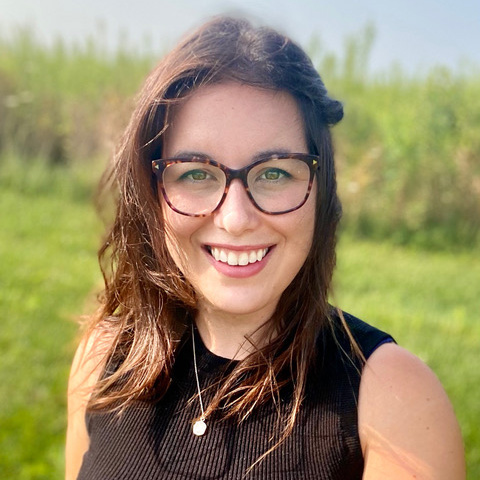
Bronte Charette obtained her B.Sc. in Chemistry from the University of Winnipeg in Canada where she began her research career in synthetic organometallic chemistry. She continued this work throughout her M.Sc. studies under the supervision of Prof. Jamie Ritch at the University of Manitoba. Bronte received her Ph.D. in Chemistry in 2021 from the University of California, Irvine as a Natural Science and Engineering Research Council of Canada (NSERC) Postgraduate Doctoral Fellow. Her doctoral work focused on thermodynamic and kinetic investigations for the proton-coupled electron transfer reactions of transition metal complexes bearing proton and redox noninnocent ligands under the supervision of Prof. Alan Heyduk. Over the course of her doctoral studies, Bronte received the UC Irvine Most Promising Future Faculty Award, the American Institute of Chemists Graduate Student Award and two Graduate Dissertation Fellowships. Her current research in the group of Prof. Lisa Olshansky focuses on synthesizing switchable transition metal complexes and measuring the thermodynamic and kinetic parameters dictating their reactivities for renewable energy conversion strategies.
Kimberly C. Ransom – Department of Education Policy, Organization & Leadership
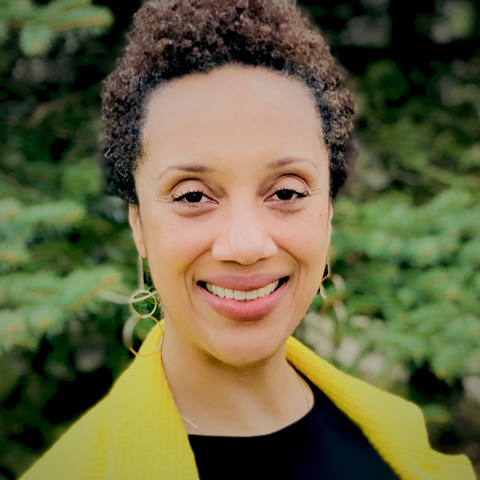
Dr. Kimberly C. Ransom is an interdisciplinary historian who studies the History of African American Education and the History of Childhood. Her research examines the oral histories and material objects of Black children who once attended segregated schools in the Deep South during the Jim Crow Era (1940-1969). As a public scholar and artist, Kimberly also uses her historical research to create public exhibits related to African American childhood in and around schools. In her most recent project, she has worked in partnership with her dissertation respondents to create a local museum in the sole remaining Rosenwald Schoolhouse in Pickens County, Alabama.
Dr. Ransom has received a number of fellowships and awards for her research and leadership including the 2019 NAEd Spencer Fellowship, the 2018 Rackham Public Scholarship Fellowship, the 2017 Rackham Public Scholarship Grant, the 2015 Jackson Scholar Award, the 2011 Chicago Community Trust Fellowship, the 2013 University of Chicago President’s Diversity Leadership Award, and the 2010 New York University Women of Color Policy Fellowship. She earned her Ph.D. in Educational Studies from the University of Michigan, M.A. from DePaul University, and a B.S. from Bradley University.
Stephanie Thurston – Department of Religion
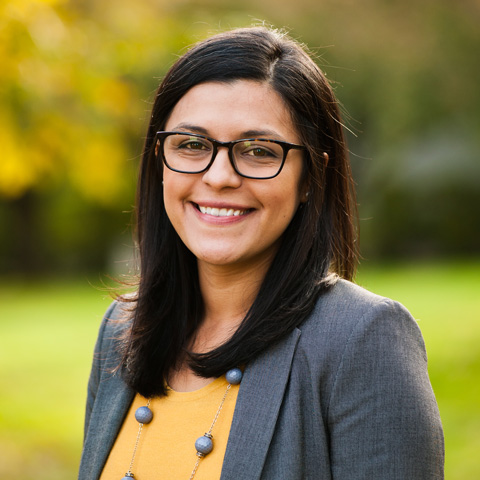
Dr. Thurston’s research and teaching interests include religion and politics, philosophical and theological social ethics, political theory, and political theology. She has taught and written on complicity and moral responsibility and is especially interested in moral and political questions concerning school segregation, policing and prisons, and migration. Dr. Thurston recently completed a Postdoctoral Fellowship with the Program for Leadership & Character and the Divinity School at Wake Forest University. She received her B.A. in Religious Studies and Politics/International Relations from Scripps College and earned her M.A.R in Ethics from the Divinity School at Yale University. She completed her Ph.D. in the Religion and Society program at Princeton Seminary. Her dissertation, titled Making Citizens in a Credential Society: Identities, Values, and Practices at Brooklyn High, is an ethnographic study of moral and civic formation at a Title I public high school.
Renee Harton – Department of Materials Science & Engineering
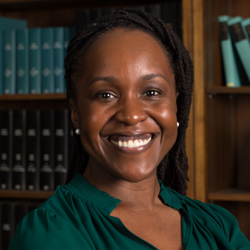
Renee Harton is an Illinois Distinguished Postdoctoral Scholar conducting research in the labs of Professor David Cahill and Professor Nadya Mason. She received her Bachelor of Science from the Massachusetts Institute of Technology and her Doctor of Philosophy from the University of Michigan, both in the field of Physics. Her research area focuses primarily on studying the magnetization dynamics of intermetallic magnetic compounds in the fast and ultrafast regime using both Time-Domain Thermoreflectance and the Time-Resolved Magneto-Optic Kerr Effect.
Blair Smith – Department of Fine & Applied Arts / Krannert Art Museum
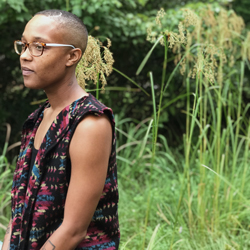
Blair Smith loves to rigorously play and make Black girl sounds, spaces, lands, planets, and galaxies with Black girls. Her artist-scholar-curator dreams and praxis emerge where Black girlhood as a creative and relation building life force with Black girls/women, Black feminist poetics, sound, and alternative modes of cultural work and production meet. Her work previously explored poetics and sound as practiced with Black girls and collective Saving Our Lives Hear Our Truths (SOLHOT), a space to envision Black girlhood and our world anew, locally and galaxy-wide.
The collective, music-making, love and poetics of nuanced and intergenerational relationships with Black girls and women are conceptual and creative obsessions of her work. Creative forms take shape in the curation of alternative Black girl centered spaces, DJ sets, sonic research, samples, beat and loop making, poetry, visual art and performance.
Blair continues to expand understandings of Black girlhood with SOLHOT as a post doc fellow in art education with the Krannert Art Museum at the University of Illinois at Urbana-Champaign (2019–21). Her curatorial and artistic praxis is focused on Black girl celebration, Black feminist poetics, sound art and design with Black girls locally and worldwide.
Gonzalo Campillo-Alvarado – Department of Chemical and Biomolecular Engineering
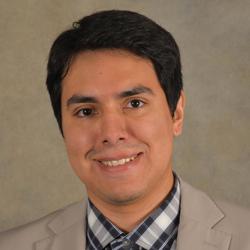
Gonzalo Campillo-Alvarad obtained his B.Sc. in Biopharmaceutical Chemistry at Universidad Veracruzana in Xalapa, Veracruz, Mexico, spending one semester at the National University of Ireland, Galway doing research in the field of small-molecule crystallography. He later completed a M.Sc. in Chemistry with emphasis on supramolecular chemistry at Universidad Autónoma del Estado de Morelos, Mexico, as a fellow of the Mexican Council of Science and Technology (CONACyT). In 2020, he received his Ph.D. in Chemistry with emphasis on the development functional materials (e.g., pharmaceutics, materials for separation, photoactive solids) from the University of Iowa under the supervision of Prof. Leonard R. MacGillivray also as a CONACyT fellow. His current research in the group of Prof. Ying Diao (Department of Chemical and Biomolecular Engineering, UIUC) focuses on the understanding of dynamic properties in single crystals of organic semiconductors aiming to design the next-generation multifunctional electronics.
Gonzalo has received multiple recognitions and awards, including the A. Lynn Anderson Award for Research Excellence and the Outstanding Teaching Assistant Award (University of Iowa), the Paul R. Sharp Award (University of Missouri-Columbia) and the Young Scientist Award from the International Union of Crystallography (IUCr). He was also the co-chair of the 1st American-Mexican Symposium on Supramolecular Materials Design (2019, Iowa City).
Víctor H. Cervantes – Department of Psychology

Víctor H. Cervantes is a Colombian scholar and holds an M.S. in Statistics from Universidad Nacional de Colombia, an M.S. in Psychology and an M.S. in Mathematics from Purdue University, and a Ph.D. in Mathematical and Computational Cognitive Science from Purdue University, which he started thanks to a Fulbright fellowship. His research focuses on the mathematical development of a probabilistic theory of contextuality, and mathematics and statistics applications to psychological modeling and educational assessment.
Stewart M. Coles – Department of Communication
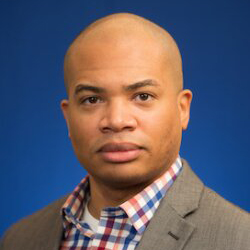
Stewart M. Coles research examines how people develop their understanding of social issues related to identity. More specifically, he studies the way media depictions of social issues and marginalized groups evoke prejudice and stereotypes, shape and activate identity, and influence public opinion and political behavior. He is especially interested in the political effects of entertainment media and how audience attributes affect whether people consider entertainment media to be politically relevant.
Previously, Coles served for 10 years in the U.S. Marine Corps as a public affairs officer, and he has a background in public relations, advertising, and multimedia design. He holds a Ph.D. in Communications and Media from the University of Michigan.
Kayla Nguyen – Department of Materials Science and Engineering

Kayla Nguyen received her Ph.D. from Cornell University, where she won the Lemelson-MIT Student Prize for her contributions as a co-inventor of the Electron Microscope Pixel Array Detector. Kayla now focuses her time developing new electron microscopy techniques with an emphasis on imaging the smallest unit of magnetism – the electron spin. Although she is first a scientist, Kayla is extremely passionate about building more pathways for girls and young women in the STEM fields.
Saima Siddiqui – Department of Materials Science and Engineering
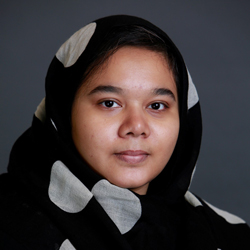
After completing her Ph.D. in Electrical Engineering from MIT in 2018, Saima Siddiqui spent nine months at Argonne National Laboratory as a postdoctoral researcher in Materials Science division. Her research focus is to explore novel physical phenomena of electron’s spin in quantum materials and implement them in building Boolean and non-Boolean devices for next generation energy-efficient computing. She received her Master of Science degree in Electrical Engineering from MIT in 2014 and completed her undergraduate studies in Electrical and Electronic Engineering at Bangladesh University of Engineering and Technology (BUET) in 2011. After her undergrad, she worked as a lecturer in the same department at BUET. During her Ph.D., she was involved in organizing Path of Professorship – a workshop for female graduate students and postdocs interested in career at academia. She has been selected as an EECS rising star in 2019.
More about the Illinois Distinguished Postdoctoral Research Associates and Visiting Scholars Program.